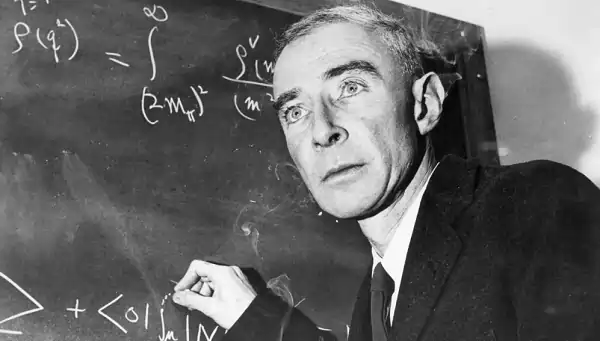Highly Anticipated Biopic “Oppenheimer” Hits Theaters – A Riveting Tale of the Atomic Bomb’s Creator
The highly anticipated film “Oppenheimer” finally arrives in U.S. theaters this Friday, becoming one of the first blockbuster biopics to be released since the end of the covid-19 pandemic.
Director Christopher Nolan’s latest work tells the story of the atomic bomb through the eyes of its creator, J. Robert Oppenheimer, played by “Peaky Blinders” star Cillian Murphy.
The film, which features an all-star cast including Matt Damon, Emily Blunt, Florence Pugh and Robert Downey Jr. is based on Kai Bird and Martin J. Sherwin’s Pulitzer Prize-winning biography, “American Prometheus: The Triumph and Tragedy of J. Robert Oppenheimer.”
Oppenheimer: The Moral Dilemma of the Atomic Bomb’s Father
Oppenheimer is considered the father of the atomic bomb. Born on April 22, 1904 in New York, he was the son of a German textile importer. He quickly rose to fame as an internationally renowned physicist, hired by the U.S. government to create an atomic bomb that could quell the threat from Nazi Germany.
But his career was marred by controversy as he grappled with the implications of the world’s first nuclear explosion.
Two decades later, Oppenheimer told interviewers that when the Trinity test bomb exploded on July 16, 1945, in a remote part of the New Mexico desert, “we knew the world would not be the same. A few laughed, a few cried, most were silent.” He said he remembered a line from the Bhagavad Gita: “Now I have become Death, the destroyer of worlds.”
Oppenheimer believed that the creation of an atomic bomb was necessary to end World War II. But he was tormented by the knowledge that by creating the bomb, he was also opening the door to the destruction of the world.
This moral conflict eventually led to his disgrace, when he opposed the creation of the hydrogen bomb on moral and political grounds, and was accused of holding back the development of that project.
The U.S. Atomic Energy Commission (AEC) said in 1954: “Had Dr. Oppenheimer enthusiastically supported the thermonuclear program before or after the determination of national policy, the H-bomb project would have been pursued with considerably more vigor, thus increasing the possibility of earlier success in this field.”
The Manhattan Project: Oppenheimer’s Race Against Nazi Nuclear Threat
The rise of Adolf Hitler in Germany prompted physicists such as Albert Einstein, Leo Szilard and Eugene Wigner to warn the U.S. government of the danger to humanity if the Nazis were the first to make a nuclear bomb.
In response, the U.S. government assembled a team of leading atomic physicists, led by Oppenheimer, who had built an international reputation for his research on subatomic particles.
In what became known as the Manhattan Project, Oppenheimer and his team moved their research to remote Los Alamos, New Mexico, and in July 1945 the world’s first nuclear explosion occurred.
Less than a month later, on August 6 and 9, 1945, the U.S. military dropped atomic bombs on Hiroshima and Nagasaki, killing 110,000 people on the spot and tens of thousands more over the course of the year. In October of that same year, Oppenheimer resigned from his post.
J. Robert Oppenheimer: A Complex Legacy of Loyalty and Controversy
In 1947, Oppenheimer went on to head the Institute for Advanced Study in Princeton, New Jersey. From 1947 to 1952 he also served as chairman of the General Advisory Committee of the Atomic Energy Commission, which in October 1949 opposed the development of the hydrogen bomb.
After World War II, as the world entered the Cold War, U.S. intelligence services suspected Oppenheimer of having ties to the Communists. This was followed by a broader determination to crack down on alleged Communist infiltration in various areas of the U.S. government.
Oppenheimer was accused of disloyalty for his opposition to the creation of the hydrogen bomb and for his friendship in the 1930s with Communist students who supported the anti-fascist cause in the Spanish Civil War. As a result, in 1954 he lost his security clearance and his position as an advisor to the U.S. government.
Meanwhile, the threat of nuclear war dominated international politics.
Oppenheimer spent the rest of his years becoming increasingly concerned about the conflict between morality and scientific advancement.
He retired from the Institute for Advanced Study in 1966 and died the following year, at the age of 62.
Last year, the U.S. Department of Energy formally overturned the AEC’s revocation of Oppenheimer’s security clearance, calling the 1954 process “flawed.” Energy Secretary Jennifer Granholm stated in December, “As time has passed, more evidence of the bias and unfairness of the process Dr. Oppenheimer was subjected to has come to light, while evidence of his loyalty and love of country has only been affirmed.”

